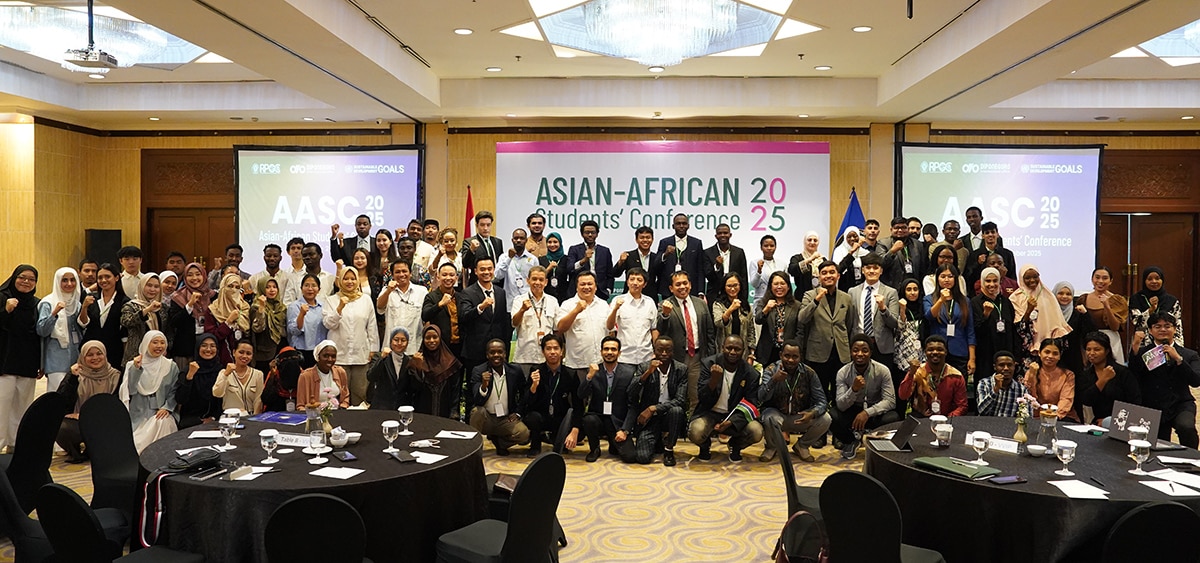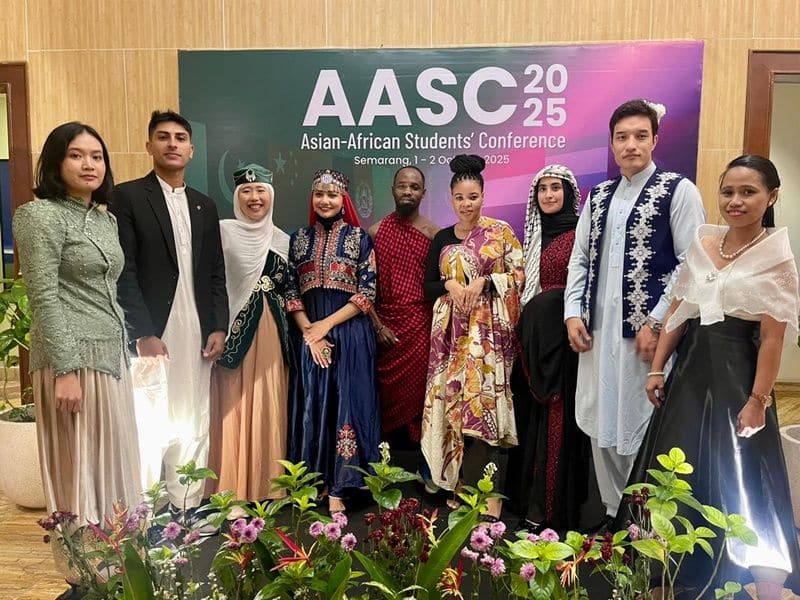UNDIP, Semarang (October 1, 2025) – Celebrating the spirit of diversity, the International Office at Universitas Diponegoro (KUI UNDIP) hosted the Asian-African Students’ Conference 2025, bringing together 47 international students from 26 countries across Asia and Africa. Carrying the theme “The Rise of Asia-Africa Spirit: Global South Unites for Global Challenges”, the conference served as a discussion forum for young international leaders, this year focusing on the three pillars of the SDGs: environmental, social, and economic challenges.
The Asian-African Students’ Conference 2025 took place on October 1–2, 2025, featuring an International Conference and Cultural Night at the Grand Candi Hotel ballroom (1/10). The talk show welcomed distinguished speakers:
– H.E. Amb. Prof. Dr. Eddy Pratomo, S.H., M.A. (Professor of International and Maritime Law)
– Gridhanya Mega Laidha, S.H., LL.M. (Indonesia Ocean Justice Initiative/IOJI)
– Pulung Widhi Hari Hananto, S.H., M.H., LL.M. (Deputy Director of Reputation, Partnership, and Global Connectivity)
Prof. Dr. Ir. Hadiyanto, S.T., M.Sc., IPU., Director of Reputation, Partnership, and Global Connectivity, officially opened the conference on behalf of UNDIP Rector Prof. Dr. Suharnomo, S.E., M.Si., warmly welcoming participants from around the world. “We are very proud of both UNDIP students and international students who actively voice their thoughts. This event shows that the spirit of struggle remains alive. Let us continue the legacy of the 1955 Asian-African Conference. From these students, we will gather fresh perspectives to address energy issues, global health, and technological disruption,” he said.

According to Prof. Hadiyanto, the forum acts as a bridge between knowledge and solidarity, uniting diverse ideas from across nations. It also represents UNDIP’s commitment to its tagline, “Noble and Valuable UNDIP,” and its steps toward becoming a world-class university.
Project Manager Pulung Widhi Hari Hananto emphasized that the forum provides students the opportunity to sharpen leadership skills, promote innovation, and find solutions to global issues such as humanitarian crises, the blue economy, food security, and the Sustainable Development Goals.
“This is a place for all of us to learn. It will shape a new spectrum of youth spirit to improve the quality of life. Quoting Prince Diponegoro, ‘Destiny is certain, but life must go on.’ Today we face many problems related to climate and ecosystems, but together we can solve them,” Pulung said.
Joining via Zoom meeting, Prof. Dr. Eddy Pratomo presented “Diplomatic Issues and Maritime: Sea Level Rise – An Asia-Africa Perspective.” He highlighted the sea level crisis, which poses a threat to food security, fisheries, and coastal boundaries. “Asian and African nations share similar challenges and risks. Through this conference, we can strengthen legal diplomacy at the UN, foster blue economy collaboration, and safeguard resources in the Indian Ocean region,” he said.
Gridhanya Mega delivered her talk on “Rethinking Law in the Age of the Anthropocene.” She explained that the Anthropocene—a concept introduced by ecologist Eugene F. Stoermer in the 1980s and popularized by chemist Paul Crutzen in the 2000s—marks a planetary crisis in which human activity has become the dominant force shaping the Earth’s climate, ecosystems, and even the chemical composition of the atmosphere and oceans. Human intervention, she said, poses threats to the planet’s survival, driving changes in weather patterns, biodiversity loss, marine degradation, pollution, and soil mismanagement.
The Anthropocene also poses a threat to human security, causing instability that fuels health crises, food shortages, violent conflict, economic insecurity, and social inequality. “Transformative legal change is needed, especially within the framework of Law in the Anthropocene, to balance the relationship between humans and nature. The Earth’s resources are abundant but finite, which makes ecological conservation essential. One way is by adopting practices from Indonesia’s indigenous cultures: protecting sacred forests, implementing fishing ground closure systems, and reviving traditions that honor the sea and forest as part of Mother Nature,” she explained.
Pulung Widhi later spoke on “Climate Action and Climate Justice: In the Context of Asia-Africa Cooperation.” He emphasized that international agreements, such as the UN Framework Convention on Climate Change (UNFCCC), the Kyoto Protocol, and the Paris Climate Agreement, already provide pathways for global environmental conservation.
At the forum, ideas and innovations from across Asia and Africa converged into shared solutions to tackle the climate crisis. “Together with experts, we are discussing sustainable and safe use of natural resources to secure the future of humanity and our planet,” he said.
The event continued with Cultural Night, where international students showcased traditional performances in national attire. On the second day (10/2), participants engaged in cross-cultural understanding activities, visiting Semarang’s cultural landmarks, including Sam Poo Kong Temple, Lawang Sewu, and Kota Lama. (Public Communication/ UNDIP/ Titis)










